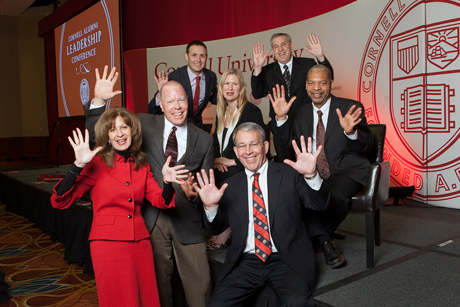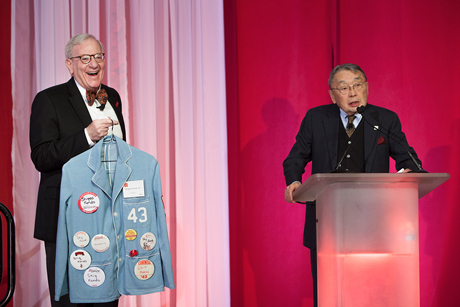CALC 2014 celebrates alumni volunteer leadership
By Jose Perez Beduya

For those who attended the Cornell Alumni Leadership Conference (CALC) at the Boston Marriott Copley Place, Jan. 17-19, the business of volunteering for the university was equally serious and fun.
Now in its fifth year, CALC, which is organized by the Division of Alumni Affairs and Development’s (AAD) Office of Volunteer Programs, brought together more than 700 alumni leaders from as close as Boston to as far away as Beijing. Helping to facilitate the event, a group of 60 current students mingled with attendees.
Participants strategized for the upcoming year and beyond with their respective boards, classes and affinity groups, and attended skills development sessions led by alumni and staff. They also engaged with guest speakers and rubbed elbows with friends old and new – including a “live statue” of Ezra Cornell that ambled in a slow, stately way amid a galvanized Big Red crowd at the tailgate and viewing party for the Cornell-Harvard men’s hockey and Cornell-Dartmouth women’s hockey games Friday evening.
Among the weekend’s highlights was a panel discussion on the challenges and joys of leadership at Cornell. Moderated by alumni-elected trustee Meredith Rosenberg ’92, the panel featured Andy Noel, director of athletics and physical education; Hans Bethe House professor-dean Scott MacDonald ’78, Ph.D. ’86; Mary Opperman, vice president for human resources and safety services; and Deans Lance Collins (College of Engineering) and Alan Mathios (College of Human Ecology). Topics discussed included the urgency of recruiting and retaining outstanding faculty and staff and creating a nurturing community for students. The important role of Cornell alumni, parents and friends – who contribute wisdom, guidance and financial support to the university – and the vitality of cross-campus connections were also emphasized.
“The culture of collaboration is profound at Cornell,” said Mathios. “Many people perceive Cornell as a collection of colleges, but it’s really pretty seamless.”
Other highlights included: “Promoting Student Health and Well-Being” led by Susan Murphy ’73, Ph.D. ’94, vice president for student and academic services, which showcased the work of student leaders; “Cornell’s Secret Weapon: Volunteers for Life,” a panel of alumni and one student leader, moderated by Kelly Brown ’88, MBA ’92; and “Volunteering@Cornell: Past, Present and Future,” a panel of staff, faculty and alumni leaders, moderated by Charlie Phlegar, vice president for alumni affairs and development.
In addition, CALC attendees got a preview of upcoming university developments, from plans for Cornell’s sesquicentennial events to the unveiling of the beta version of a new online volunteer management system, which will match university volunteers with leadership and service opportunities across Cornell groups near and far.

CALC also served as a venue for recognizing and honoring alumni volunteer achievements. The second annual Cornell Alumni Association Cup – recognizing innovative programs developed by alumni or parent volunteer groups – was awarded by popular vote to the Alumni Duff Ball committee for its first-ever event in New York City last March, organized in partnership with AAD’s Student and Young Alumni Programs. The success of Alumni Duff Ball-NYC – attended by more than 400 alumni and raising $45,000 in support of student and academic services – has led to its second iteration, planned for March 1. Jonathan Feldman ’08, who helped originate Duff Ball on campus, accepted the award on behalf of the Alumni Duff Ball committee.
The William “Bill” Vanneman ’31 Outstanding Class Leader Award – named in honor of its first recipient who served his class for more than 75 years – was, given to Shigeo “Shig” Kondo ’43 for 55 years of exemplary service. Kondo, whose life at Cornell was disrupted by World War II, bears the distinction of being the 10th Vanneman awardee.
“Behind every successful man is a woman and a surprised mother-in-law,” the 91-year-old Kondo joked in his acceptance speech. He recounted how, after the bombing of Pearl Harbor, his junior year was cut short when he was deported to Japan as an “enemy alien” even though he grew up in New Jersey, where his family had moved when he was 3.
“What sustained me at that time was dreaming about returning to that special place on the Hill – Cornell,” he said to an audience who rose to a resounding, standing ovation.
Media Contact
Get Cornell news delivered right to your inbox.
Subscribe